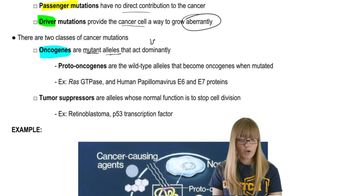Identify the normal functions of the following genes whose mutations are associated with the development of cancer.
p53 (Li–Fraumeni syndrome)
 Sanders 3rd Edition
Sanders 3rd Edition Ch. 11 - Gene Mutation, DNA Repair, and Homologous Recombination
Ch. 11 - Gene Mutation, DNA Repair, and Homologous Recombination Problem 1
Problem 1Identify the normal functions of the following genes whose mutations are associated with the development of cancer.
c-MYC (Burkitt lymphoma)
 Verified step by step guidance
Verified step by step guidance
Verified video answer for a similar problem:
Key Concepts
c-MYC Gene Function

Proto-oncogenes and Oncogenes

Burkitt Lymphoma
Identify the normal functions of the following genes whose mutations are associated with the development of cancer.
Which of these genes would you classify as a proto-oncogene and which as a tumor suppressor gene? Explain your categorization for each gene.
Identify the normal functions of the following genes whose mutations are associated with the development of cancer.
APC (familial adenomatous polyposis)
Identify two general ways chemical mutagens can alter DNA. Give examples of these two mechanisms.
Go online to the Online Mendelian Inheritance of Man (OMIM) website. Look up the following genetic conditions and answer the questions posed about them.
Look up Tay–Sachs disease (TSD), OMIM number 272800, and give the name and abbreviation of the affected gene and the chromosome location of the gene.
Go online to the Online Mendelian Inheritance of Man (OMIM) website. Look up the following genetic conditions and answer the questions posed about them.
Go to the 'Population Genetics' section discussing the TSD gene. In a few sentences, summarize the human population in which TSD is most frequently found and give the approximate frequency of heterozygous carriers for the TSD mutation in North American Jews.